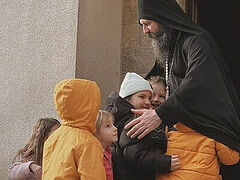As we approach Gazimestan, our column is not so long as it was in former times. The Kosovo police are not allowing automobiles in, only buses. We walk to the monument on foot. The sun is bright; it scorches but doesn’t melt like it usually does here in the summer. Vidovdan (the commemoration of St. Lazar’s defeat in Kosovo) can be felt in the cool breeze across Kosovo field; in this blessed breeze you can feel with your skin what happened here 635 years ago—the most important Serbian battle, the battle for the Kingdom of Heaven.
At the post gate we are searched. “Everything Serbian should be left behind! It’s forbidden!” We pass through. Several hundred of the faithful, our Metropolitans Joanikije and Teodosije, bishops, monastics, priests at the fore. It is quiet; you can hear the crackling of wax candles, the wondrous smell of wax mingling with the fragrances of the field. People cross themselves—we are commemorating all those who fell in the battle on Kosovo Field. Fallen, like Prince Lazar, not for the earthly but for the Heavenly Fatherland. A quiet service, but loud sighs.
 Prince Lazar’s testament at Kosovo
Prince Lazar’s testament at Kosovo
Metropolitan Joanikije of Montenegro and the Littoral encourages those present at the commemoration prayers for Serbs: Kosovo, in Vladyka’s words, was lost only for those who have lost themselves—in time, space, and faith. The Metropolitan says that Christians did not lose Kosovo; there can be no talk of that among people of the Church.
“The Orthodox Serbian people, no matter where they might live now, are right next to the Kosovo Serbs. And I think that this applies to all Orthodox brothers and sisters. They are with us; we are not alone. Why? Because here in Kosovo and Metohija Orthodoxy is being guarded and struggles. New “Kosovo agreements” are always being signed, but the most important agreement was signed by the saints of Serbia; by Prince Lazar in 1389, by Milos Obilic and their co-strugglers-martyrs, about which we prayer and will continue to pray.
The atmosphere is truly fraternal—warm like this summer day, but not hot, like it once was. It is strange how little noise we make. Someone starts singing but it quickly fades. Most of the Serbs are from Montenegro, fewer from central Serbia, and fewer still from Kosovo and Metohija. Not a single government official.
There aren’t many police, but around the perimeter of Kosovo are special forces and gendarmes. Military helicopters slowly patrol the field.
The wax melts from the flames and the sun. The smell of lavender wafts over Kosovo Field. Flags with embroidered crosses unfold—just as they did in the time of St. Lazar. Vidovdan, the day of the Battle of Kosovo, is a reminder to Serbs of their way of the Cross, of their sacrifice for Christ, their faithfulness to Him. That is why Serbs call St. Lazar not a prince but a tsar—he showed us an example of following Christ to the true Kingdom, and not the earthly one. To renounce your heavenly Fatherland means renouncing Christ. This is what I think Serbs should remember, following after St. Lazar. We shall remember. And we shall teach our children and grandchildren to do the same.





